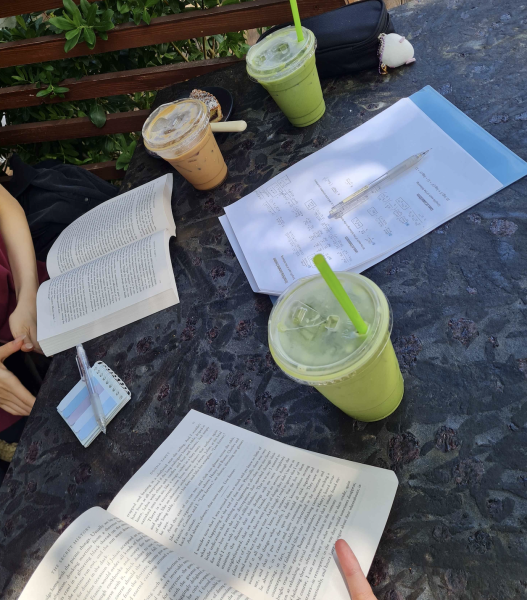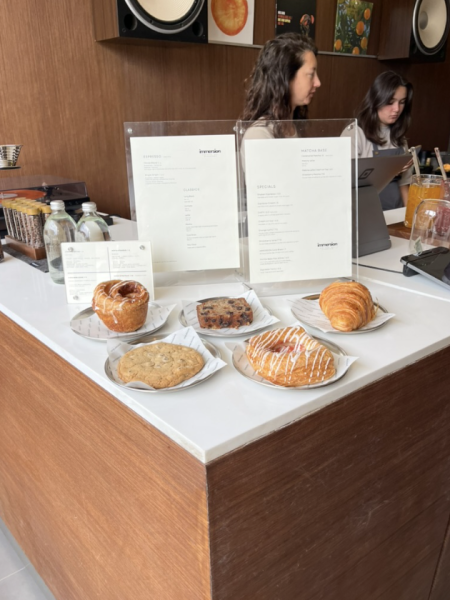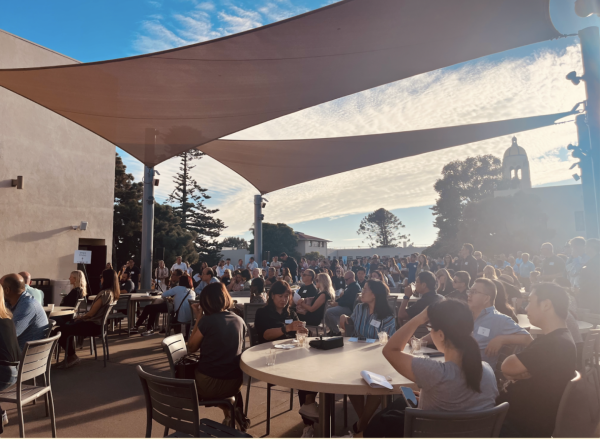This Is Why We Can’t Have Nice Concerts
The drawbacks of today’s concerts, from rude fans to overpriced tickets
Photo courtesy of Niamh Malhotra
Seniors Novalyne Petreikis and Niamh Malhotra at a Harry Styles Love on Tour concert on November 15, 2022.
From Taylor Swift to Harry Styles to Beyoncé, it’s impossible to talk about modern concerts without discussing $2,000 resale tickets, the monolithic Ticketmaster, and the miscellaneous projectiles hucked at the stage.
Social media, a ticket-buying monopoly, and rude fans have all revolutionized concert culture in unprecedented ways, making a pleasant experience almost impossible. “I feel like it’s stressful every [concert] no matter what,” explained Tali Ben-Yehuda (‘25), a music fan who had a nerve-racking experience buying tickets for Taylor Swift’s Eras Tour last fall.
One of the biggest flaws in modern-day concerts is the process of procuring tickets. Because of the monopoly Ticketmaster has on the ticket sale industry, fans are subject to the whims of the company if they want a chance to see their favorite singer or band.
Dynamic pricing, which allows prices to fluctuate during ticket sales depending on the demand, leads to tickets becoming very expensive for well-known artists. This became a problem for rapper Drake’s tour earlier this year: tickets were initially listed with prices ranging from $69.50 to $329.50, but high demand caused them to rise to as much as $1,182. Beyoncé and Bruce Springsteen fans faced similar issues, with tickets for their upcoming tours reaching $1,000 and $5,000 respectively.
As Laurel Daly (‘23) — a frequent concert-goer who was unsuccessful in getting Eras Tour tickets — said, “It’s really confusing and it’s really frustrating” to buy tickets. Laurel mentioned how this confusing system means people who are unsuccessful in getting tickets will either have to buy resale tickets, or just not go at all.
Often resale prices are marked up and unaffordable. In the aftermath of the Eras Tour sale, tickets on online resale ticket marketplace Stubhub were marked up thousands of dollars. According to CBS, a Twitter user even noticed some selling for $22,500.
In addition to pricing issues, simply navigating Ticketmaster is an ordeal. Because of unprecedented demand and the sale’s three-hour delay, many students planning to go to the Eras Tour experienced stress and confusion while trying to buy tickets
Those buying Eras Tour tickets faced a variety of issues, from glitches, to confusing messages, to hours of waiting in the virtual queue. Laurel summarized the experience, saying “Buying tickets for the Eras Tour was actually hell — it was so bad. It was so brutal.”
Joy Udinsky’s (‘24) issue arose when she finally got to the checkout screen after over an hour of waiting. “Every time I would click purchase, purchase, purchase, it would say, ‘someone already took them’ or ‘these tickets are gone.’” After countless tries with the same result, Joy “just decided to give up.”
Serena Zhang (‘24) eventually succeeded in obtaining tickets but faced endless issues along the way. First, the unexpected delay in the time of the sale meant it directly conflicted with her leaving school. This forced her to decide between missing her ride home or losing her shot at tickets. Ultimately Serena ended up spending two hours in the library before getting her tickets and going home on the late bus. “It’s very complicated,” she put it simply.
As New York Times writer Ben Sisario explained in a recent article about concerts, “For the average music fan, the one simple act of buying a ticket is now often a frustrating mess of high prices and surcharges, anxiety-inducing presale registrations, pervasive scalping and crushing competition.”
But unfortunately for fans, the issues don’t stop when they get their tickets. Concerts themselves have also changed in recent years — in many ways for the worse.
Social media, and especially Tiktok, has transformed the culture of seeing artists live. Concerts have become a sea of phone screens, which people use to record videos or even livestream the entire show.
Many artists have called out their own fans for spending the entirety of concerts behind a screen. Indie singer Mitski said on Twitter this past February, “When I’m on stage and look at you but you are gazing into a screen, it makes me feel as though those of us on stage are being taken from and consumed as content, instead of getting to share a moment with you.”
Tech reporter Elena Cavender writes for Mashable, a news website, digital media platform and entertainment company. In a recent article, she observed that “Instead of sitting in the feeling of being at a concert and processing it after, attendees are quick to record their experience, relive it on their phone screens, and then commodify it on Twitter and TikTok.”
Tali felt similarly. “You see videos of concerts these days and every single person has their phone out and it’s kind of scary because no one’s actually watching the concert.” She added, “People lose their sense of what a concert’s supposed to be about.”
This isn’t the only example concerning fan behavior. Another trend is disrespecting performers, even going as far as throwing things at them. As Laurel put it, “Have I noticed rude fans?…God. Yeah.”
It started out as a fun way to interact with performers — tossing sunglasses or boas on stage for the singers to wear — but people have begun to throw inappropriate items at artists. Mashable reported that indie singer Clairo, for instance, was in tears when someone threw clothing on stage during a vulnerable part of her set. Last November, an audience member flung a skittle at pop superstar Harry Styles — forcing him to hold his hand over an injured eye for the rest of the concert.
This trend is especially associated with Styles’ concerts, as he is known for interacting with fans — even if it often comes back to haunt him. “People sort of treat every single concert like a Harry Styles concert,” Tali explained, “bringing huge signs and going to a bunch of the same shows and throwing stuff and saying like, ‘Oh, this is a letter and I’m gonna toss it on stage.’” She added, “It’s a little weird.”
Many people chalk up this inappropriate fan behavior, as least partially, to Gen-Z’s inexperience. As Bela Gowda (‘24) explained, “Before COVID, I was younger… so I didn’t keep up with what was going on with concerts generally.”
While that sentiment is completely understandable, it leaves many younger fans lacking knowledge of how to act at performances. As Elena Cavender said, “Concert etiquette isn’t something many young people learned during the pandemic.”
Despite all the more negative side of concerts, however, people continue to attend them. So why are people willing to brave Ticketmaster disasters and rude fans? Because they love the music and the artists. Fans are passionate about the concerts they go to, and consider each one a big event. As Bela explained, “It’s a whole big thing and… I love, love that about it.”

Nora Bitar is a senior and the Managing Editor for The Tower. Her favorite type of articles to write are music reviews — which she can’t wait to do...







